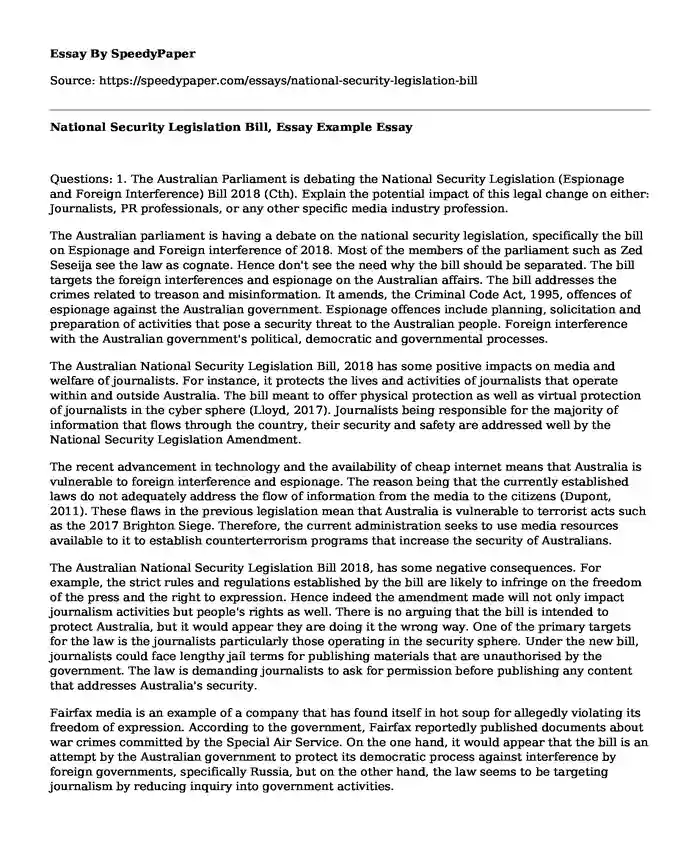
| Type of paper: | Argumentative essay |
| Categories: | Law National security |
| Pages: | 3 |
| Wordcount: | 636 words |
Questions: 1. The Australian Parliament is debating the National Security Legislation (Espionage and Foreign Interference) Bill 2018 (Cth). Explain the potential impact of this legal change on either: Journalists, PR professionals, or any other specific media industry profession.
The Australian parliament is having a debate on the national security legislation, specifically the bill on Espionage and Foreign interference of 2018. Most of the members of the parliament such as Zed Seseija see the law as cognate. Hence don't see the need why the bill should be separated. The bill targets the foreign interferences and espionage on the Australian affairs. The bill addresses the crimes related to treason and misinformation. It amends, the Criminal Code Act, 1995, offences of espionage against the Australian government. Espionage offences include planning, solicitation and preparation of activities that pose a security threat to the Australian people. Foreign interference with the Australian government's political, democratic and governmental processes.
The Australian National Security Legislation Bill, 2018 has some positive impacts on media and welfare of journalists. For instance, it protects the lives and activities of journalists that operate within and outside Australia. The bill meant to offer physical protection as well as virtual protection of journalists in the cyber sphere (Lloyd, 2017). Journalists being responsible for the majority of information that flows through the country, their security and safety are addressed well by the National Security Legislation Amendment.
The recent advancement in technology and the availability of cheap internet means that Australia is vulnerable to foreign interference and espionage. The reason being that the currently established laws do not adequately address the flow of information from the media to the citizens (Dupont, 2011). These flaws in the previous legislation mean that Australia is vulnerable to terrorist acts such as the 2017 Brighton Siege. Therefore, the current administration seeks to use media resources available to it to establish counterterrorism programs that increase the security of Australians.
The Australian National Security Legislation Bill 2018, has some negative consequences. For example, the strict rules and regulations established by the bill are likely to infringe on the freedom of the press and the right to expression. Hence indeed the amendment made will not only impact journalism activities but people's rights as well. There is no arguing that the bill is intended to protect Australia, but it would appear they are doing it the wrong way. One of the primary targets for the law is the journalists particularly those operating in the security sphere. Under the new bill, journalists could face lengthy jail terms for publishing materials that are unauthorised by the government. The law is demanding journalists to ask for permission before publishing any content that addresses Australia's security.
Fairfax media is an example of a company that has found itself in hot soup for allegedly violating its freedom of expression. According to the government, Fairfax reportedly published documents about war crimes committed by the Special Air Service. On the one hand, it would appear that the bill is an attempt by the Australian government to protect its democratic process against interference by foreign governments, specifically Russia, but on the other hand, the law seems to be targeting journalism by reducing inquiry into government activities.
The bill might be new, but it was predictable. The violation of the freedom of expression was forthcoming. As the security threat grew, anyone should have expected that the Australian people would eventually have to give up some of his or her liberties to secure their democracy. As Bronitt & Stellios (2005) explains, the violation of freedom of the press was going to arrive sooner or later.
References
Bronitt, S., & Stellios, J. (2005). Telecommunications interception in Australia: Recent trends and regulatory prospects. Telecommunications Policy, 29(11), 875-888.
Dupont, A. (2011). Living with the dragon: why Australia needs a China strategy. Lowy Institute for International Policy.
Lloyd, I. (2017). Information technology law. Oxford University Press.
Cite this page
National Security Legislation Bill, Essay Example. (2022, Feb 16). Retrieved from https://speedypaper.com/essays/national-security-legislation-bill
Request Removal
If you are the original author of this essay and no longer wish to have it published on the SpeedyPaper website, please click below to request its removal:
- Free Essay Example: Structured Routine versus Spontaneity
- Free Essay on the Effects of Alcohol on the Human Brain
- Free Essay about Power Transition: China vs. India
- Essay Example on Stress and Its Effects
- Essay Sample on Life-Changing Moment
- Why Black Lives Matter? - Argumentative Essay Sample
- Free Essay Example. Internet Friendship
Popular categories




